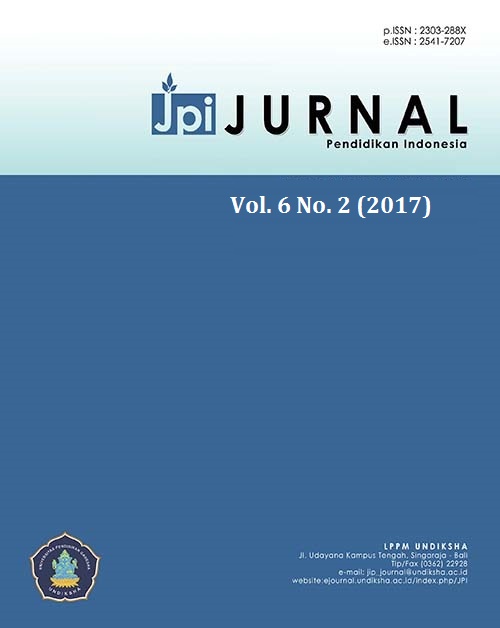The Effect of The Practical-Based Learning Model Toward Science Process Skills and Concept Comprehension of Regulation System
DOI:
https://doi.org/10.23887/jpi-undiksha.v6i2.10245Abstract
The aim of this research was to analyze the influence of practical-based learning model on the concept of regulation system of the science process skills and concept comprehension of student. Research method was a quasi-experimental with the matching pretest-posttest design. The research population consisted of all students in class XI in one of senior high school in West Sumatra with a total population of 150 students. Sampling technique was a cluster random sampling. Sample consisted of 26 students of class experiment through practical-based learning and 26 students of class control through verification practical learning. The instrument consist of a science process skills test and concept comprehension test. The data was analyzed using the Mann-Whitney test, Normalized gain. The results showed that there was a significant difference in science process skills and concept comprehension between the experimental and the control class. Herewith, it has been concluded that the practical-based learning model on the concept system of regulation improvement the science process skills and concept comprehension.
Downloads
Published
Issue
Section
License
Authors who publish with the Jurnal Pendidikan Indnesia agree to the following terms:
- Authors retain copyright and grant the journal the right of first publication with the work simultaneously licensed under a Creative Commons Attribution License (CC BY-SA 4.0) that allows others to share the work with an acknowledgment of the work's authorship and initial publication in this journal.
- Authors are able to enter into separate, additional contractual arrangements for the non-exclusive distribution of the journal's published version of the work (e.g., post it to an institutional repository or publish it in a book), with an acknowledgment of its initial publication in this journal.
- Authors are permitted and encouraged to post their work online (e.g., in institutional repositories or on their website) prior to and during the submission process, as it can lead to productive exchanges, as well as earlier and greater citation of published work. (See The Effect of Open Access)








